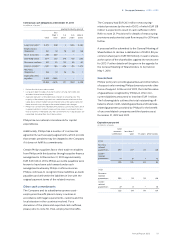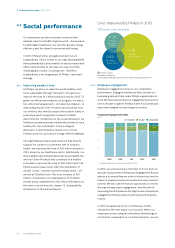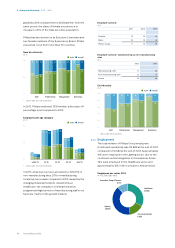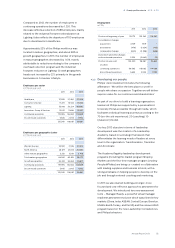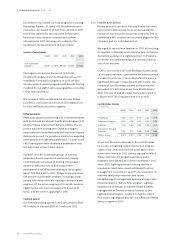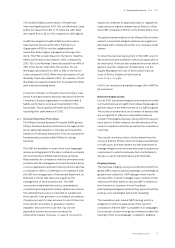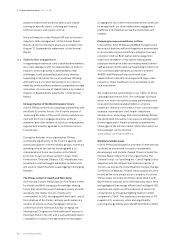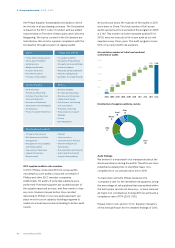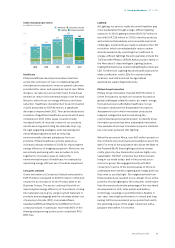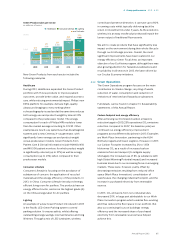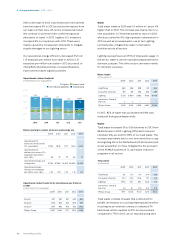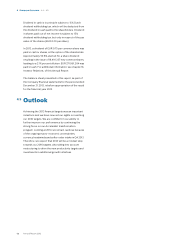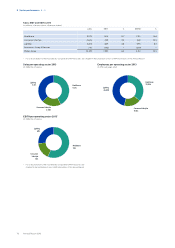Philips 2013 Annual Report Download - page 61
Download and view the complete annual report
Please find page 61 of the 2013 Philips annual report below. You can navigate through the pages in the report by either clicking on the pages listed below, or by using the keyword search tool below to find specific information within the annual report.4 Group performance 4.2.10 - 4.2.11
Annual Report 2013 61
Supplier development and capacity building
Based on many years of experience with the audit
program, we know that a combination of audits,
capacity building, consequence management and
structural attention from management is crucial to
realize structural and lasting changes at supplier
production sites. In 2013 we continued our focus on
capacity building initiatives which are oered to help
suppliers improve their practices. Our supplier
sustainability experts in China, India and Brazil
organized trainings, visited suppliers for on-site
consultancy, conducted pre-audit checks and helped
suppliers to train their own employees on topics like
occupational health and safety, emergency
preparedness and chemicals management.
We also teamed up with peers in the industry and civil
society organizations to work on capacity building at
Chinese factories via the IDH Electronics Program, an
innovative multi-stakeholder initiative sponsored by
the Sustainable Trade Initiative (Initiatief Duurzame
Handel). The goal is to improve working conditions for
more than 500,000 employees in the electronics
sector. Two years ago the program was kicked-o in
China’s Pearl River Delta, and now expanded to also
cover supplier factories in the Yangtze River Delta area.
A total of 15 Philips suppliers are now participating in
the program.
4.2.11 Conflict minerals: issues further down the chain
In line with Philips’ commitment to supply chain
sustainability, we feel obliged to implement measures
in our chain to ensure that our products are not directly
or indirectly funding human atrocities in the Democratic
Republic of the Congo (DRC). We are concerned about
the situation in eastern DRC where proceeds from the
extractives sector are used to finance rebel conflicts in
the region. Philips is committed to address this issue
through the means and influencing mechanisms
available to us, even though Philips does not directly
source minerals from the DRC and mines are typically
seven or more tiers removed from our direct suppliers.
Although this region has a rich supply of minerals, its
economy has collapsed due to decades of ongoing
conflict. In an eort to prevent minerals from financing
war, many companies worldwide have shied away from
purchasing minerals from the DRC, creating a de facto
embargo in a region where mining is often the only
source of income for local communities. We decided
that this was not the right approach and instead of
avoiding the DRC, we took the more difficult road,
supporting conflict-free sourcing from the DRC. To
promote cooperation and economic growth in the
region outside the control of the rebels, we launched
the Conflict-Free Tin Initiative. This initiative introduces
a tightly controlled conflict-free supply chain of tin from
a mine in the DRC all the way down to an end-product.
Philips is one of the industry partners brought together
by the Dutch government that initiated the program in
2012. To underline our commitment to conflict-free
sourcing, we joined a delegation in February 2013 to
visit the mine and engage with dierent local
stakeholders in the DRC. At the end of 2013 we reached
an important milestone when the first end-user
products containing this conflict-free tin were made in
our Philips Lighting factory.
During 2013 we continued our work with 349 priority
suppliers to raise awareness and conduct supply chain
investigations to determine the origin of the metals in
our products. This resulted in the identification of 191
smelters in our supply chain involved to process these
metals. We publish this smelter list on our website,
creating transparency at deeper levels in our supply
chain of those actors that we believe hold the key
towards eectively addressing the concerns around
conflict minerals. Philips encourages all smelters in our
supply chain to join the Conflict Free Smelter program
and demonstrate their conflict-free status via
independent third party assessments. 29% of the
smelters identified by our suppliers have now
successfully passed the Conflict Free Smelter
assessment. As sufficient conflict-free smelters for all
four metals (Tin, Tantalum, Tungsten and Gold) will
become available, Philips plans to direct its supply
chain towards these smelters.
We believe that industry collaboration and stakeholder
dialogue are important to create impact at these deeper
levels of our supply chain. Therefore Philips continued
its active contribution to the Conflict Free Sourcing
Initiative, a joint eort of the EICC and GeSI and others
to positively influence the social and environmental
conditions in the metals extractives supply chain. To
assist in developing a due diligence standard for
conflict minerals, we continued our participation in the
multi-stakeholder OECD-hosted program for the
implementation of the “OECD Due Diligence Guidance
for Responsible Supply Chains of Minerals from
Conflict-Aected and High-Risk Areas”. We also
continued our engagement with relevant stakeholders
including the European Parliament, other industry
organizations and local as well as international NGOs in
Europe and the U.S. to see how we can resolve the
issue.


